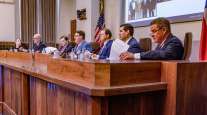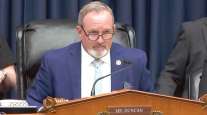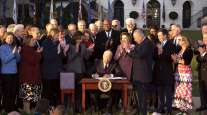Senior Reporter
Rep. DeFazio Aims to Block Trump’s Infrastructure Plan

This story appears in the June 19 print edition of Transport Topics.
WASHINGTON — Rep. Peter DeFazio is never far from home. His small office at the Rayburn House Office Building is a bona fide southwest Oregon visitor center. Visitors are greeted by posters of college football matchups featuring Oregon schools, photos of the Pacific coast and majestic mountains and a cute little beaver reminiscent of a Gund stuffed animal by the front desk.
There may be no bigger fan of the Beaver State’s southwest.
Since winning his seat in the mid-’80s, the Oregon Democrat has embodied his 4th District’s entrepreneurial ideals.
DeFazio, among his caucus’ most influential policymakers, has emerged this year as the leading voice opposing President Donald Trump’s proposal to add tollbooths on interstate highways and streamline the environmental review process.
DeFazio is among the strongest advocates for using federal funds to back the country’s transportation system. Winning his approval would go a long way if the White House and Republicans who control Congress intend to garner bipartisan support for an infrastructure bill expected to be unveiled this fall.
With Trump calling to pay for a 10-year, $1 trillion infrastructure plan partly through the privatization of roadways, bridges and airport systems, DeFazio expresses skepticism. He argues most of the public would reject the plan due to the unpopularity of tolls. He also is warning against the administration’s push to expedite the permitting process for construction projects.
In an interview June 13 at his Capitol Hill office, the stern lawmaker first elected to Congress in 1986 who comports himself as professorial, further stirred the infrastructure debate.
“That’s where the White House is hung up, between people who recognize the benefits of an enhanced national transportation system as a public good and others who see it as segmented up into little profit centers and ignoring the rest, or pretending that they’ll do something for the rest,” DeFazio told Transport Topics. “Freeways do not end at state lines, and the burdens of the system need to be shared among the 50 states to have an integral national system.”
As the ranking member on the Transportation and Infrastructure Committee, DeFazio has consistently viewed privatizing freight routes and transportation networks as supplements for a broader funding plan. He cites transportation groups that concluded less than a quarter of roadways and other corridors maintain the requisite traffic volume to appeal to tolling firms.
Freight stakeholders also argue that tolls constitute an additional tax on their industry and exacerbate congestion. Truckers and motorists already pay taxes on fuel, which are used to pay for road maintenance projects.
“You have to have a cash flow in order to privatize,” DeFazio said. “That means one of two things. It’s a revenue-producing asset, or you are going to make it into a revenue-producing asset — which means massive nationwide tolling. Except, huge portions of the interstate that need work can’t make money tolling.”
He also argues the administration would erode environmental protections under aspects of the plan they’ve presented. Regulatory streamlining provisions in the highway laws of 2012 and 2015 have yet to be implemented. As the executive branch looks to add another layer of streamlines included in previous laws, the new directives actually could slow those efforts, he said.
DeFazio has offered a plan, one that he said would ensure long-term funding for infrastructure projects.
This year, he proposed increasing the gasoline and diesel taxes, which last were raised in 1993, and accompanying them with 30-year bonds. The options for boosting funding for infrastructure plans are limited, and he shared his plan with Transportation Secretary Elaine Chao and D.J. Gribbin, the special assistant to the president for infrastructure policy. Thus far, the administration has not shown signs of support for DeFazio’s pitch.
Bill Shuster (R-Pa.), chairman of the T&I Committee, said he has been in talks with the administration to finalize an infrastructure measure that would be the “mother of all bills.” The legislation is expected to incorporate reforms in the Highway Trust Fund, the account that relies on revenue from fuel taxes to pay for infrastructure projects.
The federal tax on diesel is 24.4 cents per gallon and 18.4 cents per gallon for the gasoline tax.
Congressional observers note the packed congressional schedule is showing little signs lawmakers could accommodate the passage of a massive infrastructure bill this year. Republican leaders in the House aim to call up an overhaul of the tax code to address the trust fund’s looming insolvency, as well as reforms of an Obama-era health care law. On the Senate side, debate continues on pending nominations.
If Trump in fact is the “builder-in-chief” that supporters claim he is, DeFazio anticipates there could be at least a vigorous debate later this year on funding for roads and bridges.
“He’s certainly made a career in development [and] construction,” DeFazio said, “and I had and still retain a little bit of hope that he would look at a proposal like mine.”




